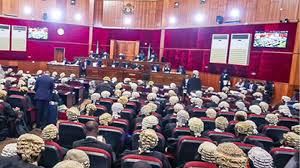A Dispute Over Legal Training Certifications Erupts in Nigeria
A cohort of recent law graduates in Nigeria has lodged a formal complaint with the Economic and Financial Crimes Commission (EFCC), alleging fraudulent practices by two prominent legal training institutions. The graduates accuse the Mediation Training Institute (MTI) and the Institute of Chartered Mediators and Conciliators (ICMC) of misrepresentation and financial impropriety related to a professional Alternative Dispute Resolution (ADR) certification course. The controversy centers around the promised delivery of three certifications and a physical induction ceremony, which were subsequently altered to two certifications and a virtual induction, despite the graduates having paid for the full package.
The crux of the graduates’ grievance lies in the alleged discrepancy between the promised services and those ultimately delivered. Upon registering for the ADR course, the graduates were assured of receiving three certifications: Associate of ICMC, Accredited Mediator of MTI, and Member of the International Law Association (ILA). Furthermore, they were promised a physical induction ceremony, a significant event for aspiring legal professionals. However, shortly before the scheduled induction, the institutes informed the graduates that only two certifications would be awarded, and the physical induction would be replaced with a virtual one. This change, the graduates argue, constitutes a breach of contract and misrepresentation of services. They emphasize that the three certifications were a key factor in their decision to enroll in the course and that the institutions never presented the training as comprising separate contracts.
Adding to the graduates’ frustration is the financial aspect of the dispute. They each paid N130,000 for the course itself and an additional N30,000 specifically for the physical induction ceremony. The abrupt shift to a virtual induction, they contend, deprives them of the experience they paid for and raises concerns about the allocation of the collected funds. The petition to the EFCC alleges “obtaining money under false pretenses, abuse of trust, and possible diversion of funds.” The graduates are demanding either the immediate conferment of all promised certifications and a physical induction or a full refund of their payments, including interest.
The dispute has unveiled a deeper rift between MTI and ICMC, two organizations that have collaborated in the past to provide ADR training to law graduates. MTI, in an email communication to the affected graduates, attributed the disruption of the planned induction to a disagreement with ICMC. Prof. Oluwafisayo Ayita, MTI’s Director of Training, Research and Development, accused ICMC of acting in bad faith and making “impossible demands” of substantial sums of money, allegedly hindering the planned induction ceremony. He further alleged that ICMC is holding onto funds belonging to MTI, further complicating the financial entanglement between the two institutions.
ICMC, however, presents a contrasting narrative. An official from the institute, speaking on condition of anonymity, denied collecting any money directly from the students and asserted that MTI acted as their agent in this particular training program. The official claims that MTI breached their memorandum of understanding by advertising a training program that included ILA without proper authorization. Furthermore, ICMC alleges that MTI failed to remit the induction fees collected from the students, making it financially impossible to conduct the physical induction as planned. The official also refuted MTI’s claims about withheld funds, providing a different account of past financial transactions between the two organizations.
The conflicting accounts presented by MTI and ICMC underscore the complexity of the situation. While MTI blames ICMC for the failed induction, citing financial disagreements and bad faith, ICMC denies these allegations, pointing to MTI’s alleged breach of contract and failure to remit necessary funds. This disagreement has left the law graduates caught in the crossfire, uncertain about the status of their certifications and the fate of their financial investment. The graduates have placed their trust in the EFCC to investigate the matter thoroughly, determine the veracity of the claims made by both institutions, and ensure that their rights and interests are protected.
The petition to the EFCC requests a comprehensive investigation into the financial dealings surrounding the ADR training program. The graduates are urging the commission to ascertain the total amount of money collected from the students, track how these funds were utilized, and identify any instances of misappropriation or fraud. They are also calling for the prosecution of any individuals found culpable and the implementation of measures to prevent similar incidents from occurring in the future. The outcome of the EFCC investigation will be crucial in determining the resolution of this dispute and holding the responsible parties accountable. The case highlights the vulnerability of students who invest in professional training programs and underscores the importance of regulatory oversight to protect their interests. It remains to be seen how the EFCC will navigate the conflicting narratives and ensure a just outcome for the affected law graduates. The incident also serves as a cautionary tale about the potential pitfalls of partnerships between training institutions and the need for transparent financial practices to maintain trust and credibility.














